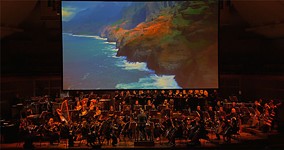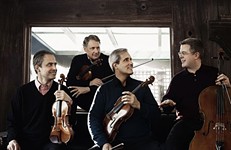History of the World as the Center of the Universe
Local Arts Reviews
Reviewed by Robi Polgar, Fri., Sept. 13, 2002
History of the World as the Center of the Universe: Considering the Long View
Blue Theater,
through September 14
Running Time: 1 hr, 15 min
A single chair sits highlighted in amber in the middle of a barren stage awash in blue light. Doubtless the performer for the evening will sit here, and, in his monologue, he'll tell us stories and make observations and perhaps enlighten us a little. With such a portentous title as History of the World as the Center of the Universe, performer Stephen Pruitt has a lot to cover in just over an hour. Pruitt is better known for his lighting designs at Austin's myriad theatres, but the poetry of working with light often stems from another sort of creative wellspring, and Pruitt is gifted not only with his ability to light a show, but to tell an interesting anecdote or formulate a unique view of just how the various facets of the universe fit together. And he doesn't limit himself to his isolated chair, either. The chunk of monologue where Pruitt explores Foucault's pendulum ... well, rather than give it away entirely, let's just say that it's both mesmerizing and unexpected.
Pruitt covers his history, sticking to themes of the air and the stars and those ancient and modern trailblazers of thought, science, and invention. There are sections that deal with Galileo, Copernicus, Einstein, Foucault, and Buckminster Fuller. Other histories are more personal: a bus ride to bail out a friend stuck in Kentucky, flying as a small child or in Vietnam, having laser surgery to improve his vision, watching a young woman's life saved at the hand of a friend. In mixing the two, the scientific and the personal, Pruitt arrives at an intriguing middle ground where the universe does seem to be magically orbiting him.
But he'd probably be the last to suggest such self-importance: Pruitt's manner of performance is mostly self-effacing, even apologetic. He often sounds as if he is making up the monologue as he goes along. As such, he quickly gains our trust -- there is nothing pretentious about this performer. His friendly demeanor makes it easy to follow his narrative threads that skirt the Larger Questions. And he's smart, too. His observations are (lightly) peppered with sardonic asides and musings and the occasional burst of something more profound. Sometimes his delivery, given to the floor, or off to the side -- a throwaway borne of self-effacement and apology -- renders his words inaudible, which is too bad. For as softly as Pruitt tells his stories, they are each well worth hearing.
The overriding theme of Pruitt's observations is that humans, socialized and prone to short-term planning, might wish to consider the long view of existence. Not one measured in the length of a mere single life, but a view that lasts for centuries. It is a daunting challenge to jettison the personal baggage of identity and ego and make such a trip -- a trip that the individual could never hope to complete. But in imagining such a trip, by offering this long view as something to ponder, Pruitt sounds as if he's mastered something universal that is the start of a fantastic, personal journey to the stars.










